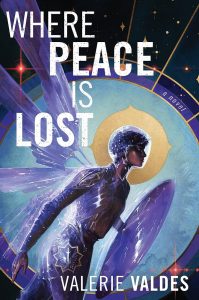The Year in Review 2023 by Liz Bourke
 Looking Back on 2023 by Liz Bourke
Looking Back on 2023 by Liz Bourke
If there’s a theme that unites the books I enjoyed reading most this year, it’s power, violence, and survival. The damage that violence inflicts on those who suffer it, and those who wield it, and the ambiguities and challenges inherent in the ethical uses of power.
Of course, some of them were also just plain fun.
Three books stand out most. One is science fiction, one fantasy, and one fantastical only by association. Valerie Valdes’s Where Peace Is Lost, Martha Wells’s Witch King, and Nicola Griffith’s Menewood. Let’s start with Menewood. My justification for including it in an SFFnal retrospective is partly Griffith’s origins as a writer of science fiction, and partly my opinion that every historical novel is itself a fantasy of what-could-have-been. Its interest in the depth of its world, the layers and layers of it, is what makes it closer kin to SFF to me, but I’m aware that this is special pleading. Nevertheless, of all the fiction I read this year, it will stay with me longest, this novel of a woman coming into – laying claim to – power in the midst of terrible grief, this deeply atmospheric and moving – gutting – story about loss, and grief, and growth, and the fate of kings. It’s not an easy book. It is, however, a fabulous one: a tremendous achievement. I have read few other novels in my life that can even come close to matching it.
Martha Wells’s Witch King is her first fantasy novel since the Books of the Raksura series. In tone and in atmosphere it reminds me rather more of her early career. (Wheel of the Infinite has long been one of my favourite books.) What begins as a novel with a very tight focus spirals tightly outward to give the reader a view of an epic world rebuilding in the wake of defeating terrifying genocidal invaders, the Hierarchs, with political intrigue galore. Kai, also known as the Witch King, a ‘‘demon’’ prince of the Fourth House, wakes from a baffling imprisonment surrounded by enemies. His old friend Ziede has also been imprisoned. She can’t contact her wife, the former Blessed Immortal Tahren Stargard, and anything that can keep them from contacting each other is bad news. (Is Tahren even alive? Ziede doesn’t know, and it’s making her angry.) The quest to find out who betrayed them into imprisonment and what has become of Tahren in the present, is paralleled by alternating chapters set in the past, when a much younger Kai first came to the human world from the underearth, his new family’s first encounters with the destructive might of the Hierarchs, and how he fell into company with the first successful rebellion against them and became what he is now. It’s a fascinating novel, fast-paced and full of compelling characters, set in a very intriguing world. I particularly enjoyed the friendship between Kai and Ziede: They’ve known each other a very long time, and it shows. But Witch King is haunted by the cost of the Hierarchs’ violence, and the effects of that destruction even decades later: Kai and Ziede are some of the few who remember the whole civilisations that the Hierarchs wiped off the map. Rebuilding is a multigenerational challenge.
 Valerie Valdes’s Where Peace Is Lost is my favourite science fiction novel of the year. In a year that also included Ann Leckie’s Translation State, Martha Wells’s System Collapse, Kate Elliott’s Furious Heaven, and Aliette de Bodard’s A Fire Born of Exile, it had stiff competition. (If I wrote about them in the detail that I’d like to, I’d run out of space.) Where Peace Is Lost stands out, though, as an action-adventure space opera novel in which the protagonist, the elite mystic warrior turned refugee Kel Garda, is a pacifist who lives her life according to the belief that killing is wrong and all life, even the lives of her enemies, is as valuable as her own. I love this novel. More than that, I appreciate its perspective. What I wrote in my review in Locus’s October 2023 issue still best expresses my reasons:
Valerie Valdes’s Where Peace Is Lost is my favourite science fiction novel of the year. In a year that also included Ann Leckie’s Translation State, Martha Wells’s System Collapse, Kate Elliott’s Furious Heaven, and Aliette de Bodard’s A Fire Born of Exile, it had stiff competition. (If I wrote about them in the detail that I’d like to, I’d run out of space.) Where Peace Is Lost stands out, though, as an action-adventure space opera novel in which the protagonist, the elite mystic warrior turned refugee Kel Garda, is a pacifist who lives her life according to the belief that killing is wrong and all life, even the lives of her enemies, is as valuable as her own. I love this novel. More than that, I appreciate its perspective. What I wrote in my review in Locus’s October 2023 issue still best expresses my reasons:
Kel and her background is reminiscent of the very first Star Wars film’s Obi-Wan Kenobi, before the Jedi existed as more than a single mystic warrior-guardian who accepts death rather than strike his enemy down. Science fiction and fantasy have a preponderance of (characters who are or were members of) martial orders, some purely dedicated to some form of violence and some who pay lip service to the idea of the sanctity of life. There are few who go beyond lip service to actually wrestle with the ethics involved in being a trained killer who strives to preserve life, even the lives of one’s enemies, and the sheer belief and commitment required to live a life in line with those ethics. There are damned few action-adventure novels whose protagonist doesn’t level up through greater and greater feats of murderous violence. Where Peace Is Lost is one of them. It’s well paced and well characterised, but it stands out in part because it doesn’t choose the easy, well-trodden path where it comes to violence. Kel doesn’t abandon her ethics, or her sense of self: doesn’t choose to kill from expediency and have to angst about reconciling her morals with newly chosen necessity. Where Peace Is Lost, rather, sees her choosing to keep her ethics, even in extremis, to reclaim her identity as a protector rather than a refugee in hiding, to kill only when she can find no other option to protect others.
It’s also a hell of a fun adventure involving war machines, rebels, and the effects of empire.
Many of the novels I read and remember from the last year I remember for all the wrong reasons. I read a number of fantasy romance novels (and no, I cannot stand the portmanteau ‘‘romantasy,’’ it makes my teeth hurt) where the fantasy worldbuilding made little sense, and/or where the characters did not seem to be believably shaped by their experience of their world/culture as depicted. Fortunately, there were at least three romance-type SFF novels whose excellence rather countered my recent inclination to write off the entire subgenre: T. Kingfisher’s latest Paladin novel, Paladin’s Faith; Foz Meadows’s All the Hidden Paths, sequel to A Strange and Stubborn Endurance; and Aliette de Bodard’s A Fire Born of Exile, the latest long-form work set in her Xuya universe.
Kingfisher’s work always has a keen sense of the ridiculous, humour married to earthy pragmatism in a way that has always reminded me of an American Terry Pratchett. And her worldbuilding doesn’t hesitate to bring the batshit-weird into play in a way that no one else can quite match. Paladin’s Faith is the latest novel to follow the trials and tribulations of one of the surviving berserker paladins of a dead god as they trip and fall headfirst into love. And trouble. Shane has an overdeveloped sense of honour and a hole in his heart where his god used to dwell. Marguerite Florian is a spy whose former employer wants her dead. Shane is one of the two new bodyguards she’s arranged for while she tries to solve that problem. From her point of view, he’s a) far too handsome and b) has too much of a martyr problem. There’s an artificer whose inventions might change the world, political intrigue, and a demon-led cult that’s going to get them both into trouble. More trouble than falling in love (and into and out of assassination attempts) has already got them. Fast-paced, full of feeling, and frequently funny, it might not be my favourite of the paladin romances, but it’s definitely an excellent romp.
Foz Meadows’s All the Hidden Paths is the furthest thing from a romp, but it’s an excellent and touching novel of what happens after you fall in love (or in this case, love-and-lust on the heels of arranged marriage) and have to keep deciding to make things work – when people keep trying to kill you or break up your relationship for the sake of politics, you’re both men, and one of you comes from a seriously homophobic society and is having to reckon with what it means to live in a society where who you love doesn’t matter. What happens after you come out? What happens now that you’re safe to fall in love with anyone? Who are you, and who will you become if people stop trying to kill you (and/or your husband)? Meadows has written a very entertaining novel here, full of emotion and political intrigue, with deeply compelling characters.
Aliette de Bodard’s A Fire Born of Exile, meanwhile, is another compelling science fiction novel that marries political intrigue with romance. It owes a debt to Dumas’s The Count of Monte Cristo, with its scholar returned from the dead to exact revenge on the corrupt magistrate who ruined her life. But scholar Sương Quỳnh is unwillingly reminded that there might be more to life than complicated, thorough vengeance by a burgeoning romance with struggling engineer Thiên Hoà. Quỳnh doesn’t expect to survive her revenge, but will she risk bringing Hoà down with her, or will her revenge look different than she’d imagined? Like much of de Bodard’s work, A Fire Born of Exile concerns itself with power, ethics, and justice, both in the hierarchical structures of society and in personal relationships. It’s fast-paced and fascinating, and was one of the absolute highlights of my reading year.
I’d add a shout-out to S.L. Huang’s gonzo gender-bent literary violence-fest The Water Outlaws, Daniel M. Ford’s sword-and-sorcery romp that’s much less boring than its title The Warden, R.J. Baker’s weird epic Gods of the Wyrdwood, Hannah Kamer’s surprising debut Godkiller, M.A. Carrick’s trilogy-ender Labyrinth’s Heart, and Moniquill Blackgoose’s To Shape a Dragon’s Breath as other fantasies that stood out for me this year.
Unfortunately, I didn’t read as widely as I wanted to: there are at least four more novels that, from everything I hear (and in some cases know from their authors’ past form), had I managed to read them, I’d have been compelled to at least mention, and those are just the books I know about.
Liz Bourke is a cranky queer person who reads books. She holds a Ph.D in Classics from Trinity College, Dublin. Her first book, Sleeping With Monsters, a collection of reviews and criticism, is out now from Aqueduct Press. Find her at her blog, her Patreon, or Twitter. She supports the work of the Irish Refugee Council and the Abortion Rights Campaign.
This review and more like it in the February 2024 issue of Locus.
 While you are here, please take a moment to support Locus with a one-time or recurring donation. We rely on reader donations to keep the magazine and site going, and would like to keep the site paywall free, but WE NEED YOUR FINANCIAL SUPPORT to continue quality coverage of the science fiction and fantasy field.
While you are here, please take a moment to support Locus with a one-time or recurring donation. We rely on reader donations to keep the magazine and site going, and would like to keep the site paywall free, but WE NEED YOUR FINANCIAL SUPPORT to continue quality coverage of the science fiction and fantasy field.
©Locus Magazine. Copyrighted material may not be republished without permission of LSFF.







